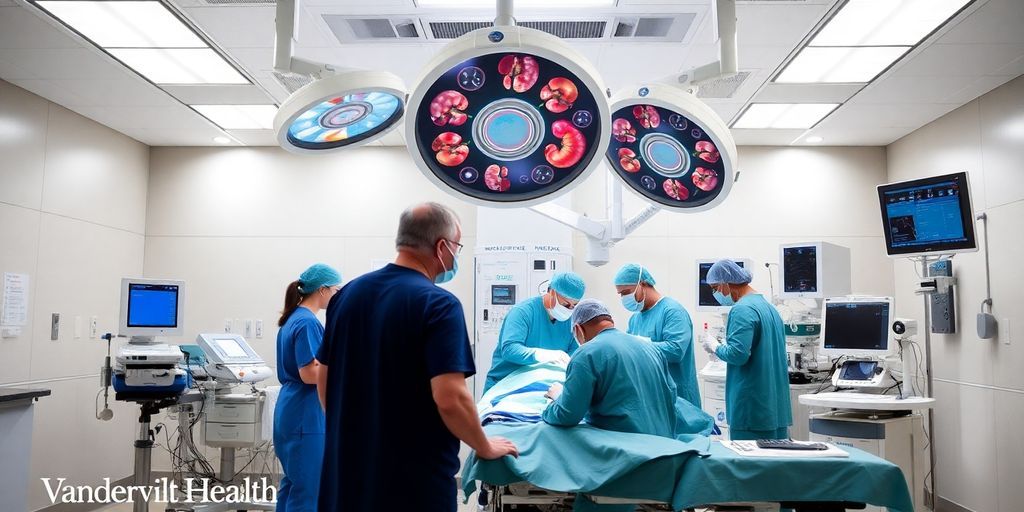Vanderbilt University Hospital has made a significant leap in organ transplantation by successfully performing its first kidney transplant using the innovative Paragonix KidneyVault™ Renal Perfusion System. This advanced organ preservation technology aims to enhance the viability of donor kidneys, ultimately expanding the donor pool and improving patient outcomes.
Key Takeaways
- Vanderbilt University Hospital is the first in Tennessee to use the Paragonix KidneyVault™ system.
- The technology allows for better preservation and transport of donor kidneys.
- It aims to increase the number of viable organs available for transplantation.
- Over 106,000 patients are currently on the national transplant waitlist, with 86% waiting for kidneys.
The Need for Advanced Preservation Technology
With more than 106,000 patients on the national transplant waitlist in the U.S., the demand for donor organs, particularly kidneys, is at an all-time high. Approximately 86% of these patients are waiting for a kidney, highlighting the urgent need for innovative solutions to expand the donor pool.
The Paragonix KidneyVault™ system is designed to address this challenge by providing a portable hypothermic perfusion technology that preserves and transports donor kidneys in optimal condition. This system not only enhances the preservation of the organ but also allows for real-time monitoring of the kidney’s condition during transport.
Benefits of the Paragonix KidneyVault™ System
The introduction of the KidneyVault system at Vanderbilt Health brings several key benefits:
- Improved Organ Viability: The system utilizes advanced preservation techniques that maintain the kidney’s condition, increasing the chances of successful transplantation.
- Real-Time Monitoring: The technology includes digital monitoring capabilities, allowing medical teams to track the organ’s temperature and status throughout the transport process.
- Expanded Donor Pool: By ensuring that kidneys can be transported over greater distances without compromising their viability, the system opens up new possibilities for organ donation.
- Support for High-Risk Patients: The technology enables Vanderbilt to serve more patients, including those who may not be candidates for transplantation at other facilities.
Expert Insights
Dr. Christian Crannell, an Assistant Professor of Surgery in the Division of Kidney & Pancreas Transplantation at Vanderbilt, expressed satisfaction with the KidneyVault system, stating, "We used the technology for transport and pumping and were satisfied with the overall feel and appearance of the kidney at the time of reperfusion. We also appreciated knowing where the kidney was during transport and knowing the organ temperature."
Looking Ahead
The successful implementation of the Paragonix KidneyVault™ system at Vanderbilt Health marks a pivotal moment in the field of organ transplantation. As hospitals adopt this technology, it is expected to significantly improve patient outcomes and increase the number of successful kidney transplants.
Lisa Anderson, President of Paragonix Technologies, emphasized the importance of this innovation, stating, "Innovations like KidneyVault enable transplant centers to accept organs from greater distances and with more logistical complexity than ever before. We look forward to empowering the clinical community to maximize the use of Paragonix devices, giving every donor kidney the best chance to reach a patient in need."
As the healthcare community continues to explore new technologies and methods to enhance organ transplantation, the introduction of the KidneyVault system at Vanderbilt Health is a promising step forward in addressing the critical shortage of donor organs.
Sources

Peyman Khosravani is a seasoned expert in blockchain, digital transformation, and emerging technologies, with a strong focus on innovation in finance, business, and marketing. With a robust background in blockchain and decentralized finance (DeFi), Peyman has successfully guided global organizations in refining digital strategies and optimizing data-driven decision-making. His work emphasizes leveraging technology for societal impact, focusing on fairness, justice, and transparency. A passionate advocate for the transformative power of digital tools, Peyman’s expertise spans across helping startups and established businesses navigate digital landscapes, drive growth, and stay ahead of industry trends. His insights into analytics and communication empower companies to effectively connect with customers and harness data to fuel their success in an ever-evolving digital world.












